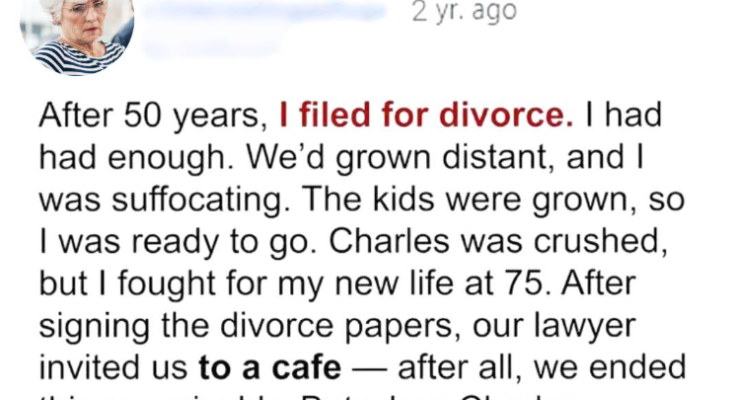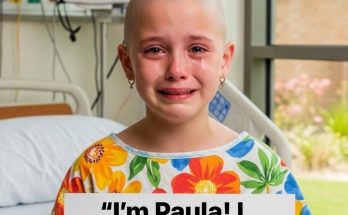After more than five decades of marriage, I finally reached a breaking point. At seventy-five, I felt a deep restlessness I could no longer ignore. My husband, Charles, and I had been together since our college years. He was ten years older, gentle, patient, and endlessly kind. To everyone around us, we were the couple who would last forever.
For the longest time, it even felt true.
We raised two wonderful children, built a peaceful life, and celebrated countless beautiful moments. But somewhere along the way, I began to feel confined. It wasn’t sudden—it crept in slowly. I realized I had never explored who I was outside of being a wife and mother. That feeling grew until it began affecting how I treated Charles.
He noticed the change, of course. I grew short-tempered. I picked fights over the smallest things. And he tried—truly tried—to understand what was wrong.
One afternoon, he found me muttering to myself.
“What’s troubling you, dear?” he asked gently.
“You are,” I snapped. “You’re driving me crazy.”
His face fell. “Please don’t say that, Rose. That hurts.”
“I’m tired of you acting like the victim!” I shouted before leaving the room.
The arguments became more frequent. Eventually, I asked for a divorce.
To my surprise, Charles didn’t protest. He simply nodded with quiet heartbreak. I think, deep down, he believed it was what would bring me peace.
Our longtime lawyer, Frank Evans, tried to talk us out of it, but I remained determined. Charles, always kind, agreed to whatever made things easier for me.
After we signed the papers, Frank suggested we share one last meal together at our favorite restaurant.
Charles accepted immediately.
“We’re ending things peacefully,” he said. “One last dinner seems fitting.”
At the restaurant, Frank ordered quickly, and then the waiter turned to Charles.
And that is when everything went wrong.
Charles asked the waiter to dim the light above our table “for my comfort,” then ordered a salad for me and a steak for himself—just like he always had.
To him, it was care.
To me, in that moment, it felt controlling.
The dimmed lights bothered nearby customers, and people began complaining. Embarrassed, I felt heat rise to my face. I couldn’t take it anymore. I said hurtful words I didn’t mean and walked out, leaving both men behind.
Later that night, I packed my bags and left the house. Charles stayed behind in the home we had shared for decades. I learned later that my leaving broke him—not because of the argument, but because he truly couldn’t understand what had gone wrong.
Neither of us slept.
Before sunrise, Charles sat down and wrote me a letter—a final attempt to reach me. He poured every emotion onto the page, tears falling as he wrote. But when he finished, he realized he didn’t know where I was. He left the letter on the mantelpiece.
Then he noticed something else: I had forgotten my medication.
He called me again and again, worried I might fall ill. I ignored every call, assuming he was trying to make me feel guilty.
Meanwhile, stress and heartbreak overwhelmed him—enough to trigger a heart attack. He managed to call emergency services before collapsing.
When Frank learned about it, he phoned me immediately.
“Rose,” he said urgently, “Charles is in the hospital. You need to come.”
My world froze. The thought of losing him pushed everything else aside. Every frustration, every misunderstanding—it all vanished. All that remained was love.
I rushed back home to gather a few of his things. That’s when I found the letter waiting for me.
My hands trembled as I opened it.
My dear Rose it began.
“I have loved you every day of our life together. I don’t know why your heart has closed, but I hope one day it opens again. I cannot imagine a world where we are not together.”
Tears filled my eyes as I read on.
“I’m sorry about the restaurant. I only dimmed the lights because they bother your eyes. I ordered the salad because of your health. I didn’t mean to make choices for you—I was only trying to help. If you come back, I promise to do better. I just want you to be happy.”
By the time I finished reading, I was sobbing. Every action I had interpreted as control was rooted in love—care I had overlooked in my need for independence.
I hurried to the hospital.
When I saw him lying there—weak, pale, but alive—I broke down.
“Charles,” I cried, taking his hand, “I’m so sorry. I don’t want a divorce. I want to spend the rest of our days together.”
He squeezed my hand gently, tears gathering at the corners of his eyes.
At that moment, I made a silent promise: never again would I overlook the love behind his actions. Never again would I take his kindness for granted.
From that day forward, I chose to cherish him the way he had always cherished me.




